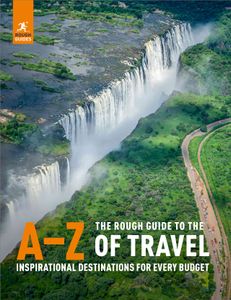Petty crime
As a tourist, you’re an obvious target for thieves (who may include your fellow travellers): carry your passport, travellers’ cheques and other valuables in a concealed money belt. Don’t leave anything important lying about in your room: use a safe, if you have one. A cable lock, or padlock and chain, comes in handy for doors and windows in cheap hotels, and is useful for securing your pack on trains and buses. It’s not a bad idea to keep $100 or so separate from the rest of your cash, along with insurance policy details and photocopies of important documents, such as the relevant pages of your passport including your visa stamp.
At street level it’s best not to be ostentatious: forego eye-catching jewellery and flashy watches, try to be discreet when taking out your cash, and be particularly wary in crowds and on public transport. If your pack is on the top of the bus, make sure it’s attached securely (usually everything is tied down with ropes) and keep an eye on it during the most vulnerable times – before departure, at meal stops and on arrival at your destination. On trains, either cable-lock your pack or put it under the bottom bench-seat, out of public view. The odd instance has been reported of travellers being drugged and then robbed, so it’s best not to accept food or drink from anyone you don’t know and trust. Bear in mind that when walking or riding in a cyclo you are vulnerable to moped-borne snatch-thieves; don’t wear cameras or expensive sunglasses hanging round your neck and keep a firm grip on your bags. If you do become a target, however, it’s best to let go rather than risk being pulled into the traffic and suffering serious injury.
The place you are most likely to encounter street crime is in Ho Chi Minh City, which has a fairly bad reputation for bag-snatchers, pickpockets and con artists. Be wary of innocent-looking kids and grannies who may be acting as decoys for thieves – especially in the bar districts and other popular tourist hangouts. It’s best to avoid taking a cyclo at night, and you’d be unwise to walk alone at any time outside Districts One and Three.
Petty crime, much of it drug- and prostitution-related, is also a problem in Nha Trang, where you should watch your belongings at all times on the beach. Again, be wary of taking a cyclo after dark and women should avoid walking alone at night. Single males, on the other hand, are a particular target for “taxi girls”, many of whom also double as thieves.
It’s important not to get paranoid, however: crime levels in Vietnam are still a long way behind those of Western countries, and violent crime against tourists is extremely rare.
If you do have anything stolen, you’ll need to go to the nearest police station to make a report in order to claim on your insurance. Try to recruit an English-speaker to come along with you – someone at your hotel should be able to help.
“Social evils” and serious crime
Since liberalization and doi moi, Vietnamese society has seen an increase in prostitution, drugs – including hard drugs – and more serious crimes. These so-called “social evils” are viewed as a direct consequence of reduced controls on society and ensuing Westernization. The police have imposed midnight closing on bars and clubs for several years now, mainly because of drugs, but also to curb general rowdiness, although you’ll always find the occasional bar that somehow manages to keep serving, particularly around De Tham in Ho Chi Minh City. That aside, the campaign against social evils should have little effect on most foreign tourists.
Single Western males tend to get solicited by prostitutes in cheap provincial and seaside hotels, though more commonly by women cruising on motorbikes. Quite apart from any higher moral considerations, bear in mind that AIDS is a serious problem in Vietnam, though the epidemic has shown signs of stabilizing.
Finally, having anything to do with drugs in Vietnam is extremely unwise. At night there’s a fair amount of drug selling on the streets of Ho Chi Minh City, Hanoi, Nha Trang and even Sa Pa, and it’s not unknown for dealers to turn buyers in to the police. Fines and jail sentences are imposed for lesser offences, while the death penalty is regularly imposed for possessing, trading or smuggling larger quantities.
Military and political hazards
Not surprisingly, the Vietnamese authorities are sensitive about military installations and strategic areas – including border regions, military camps (of which there are many), bridges, airports, naval dockyards and even train stations. Anyone taking photographs in the vicinity of such sites risks having the memory card removed from their camera or being fined.
Unexploded ordnance from past conflicts still poses a threat in some areas: the problem is most acute in the Demilitarized Zone, where each year a number of local farmers, scrap-metal scavengers or children are killed or injured. Wherever you are, stick to well-trodden paths and never touch any shells or half-buried chunks of metal.
Beggars, hassle and scams
Given the number of disabled, war-wounded and unemployed in Vietnam, there are surprisingly few beggars around. Most people are actually trying hard to earn a living somehow, and many day-tours include a visit to a factory that employs disabled workers to produce handicrafts or local products.
At many tourist spots, you may well be swamped by a gaggle of children or teenagers selling cold drinks, fruit and chewing gum. Although they can sometimes be a bit overwhelming, more often than not they’re just out to practise their English and be entertained for a while. They may even turn out to be excellent guides, in which case it’s only fair that you buy something from them in return.
A common scam among taxi drivers is to tell new arrivals in a town that the hotel they ask for is closed or has moved or changed its name. Instead, they head for a hotel that pays them commission. This may work out fine (new hotels often use this method to become known), but more often than not it’s a substandard hotel and you will in any case pay over the odds since the room rate will include the driver’s commission. To avoid being ripped off, always insist on being taken to the exact address of your chosen hotel, at least just to check the story.
Another common complaint is that organized tours don’t live up to what was promised. There are more people on the tour than stated, for example, or the room doesn’t have air-conditioning, or the guide’s English is limited. If it’s a group tour and you’ve paid up front, unfortunately there’s very little you can do beyond complaining to the agent on your return; you may be lucky and get some form of compensation, but it’s very unlikely. As always, you tend to get what you pay for, so avoid signing up for dirt-cheap tours.













